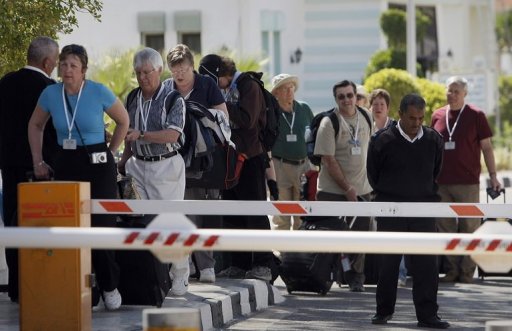CAIRO: In a jam packed Tahrir Square, protesters called on the military council to hand over power to a civilian rule on what was dubbed “Last Chance Friday.”
"We want the army to leave. It is incapable of managing this transition period," said Olaa Moustafa, 40.
Families flocked into the square with their children in tow, as mothers said they aren’t afraid of any violence.
"They won’t scare us, we will die for our country and what we believe in," said Fathia Alaa, 48, who was in Tahrir along with her nine-year-old daughter Omnia.
Reminiscent of the 18-day uprising that toppled Hosni Mubarak, protesters chanted "Leave," addressing Field Marshal Hussein Tantawi, to the sound of drums and waving Egyptian flags.
An effigy draped in a military uniform hung from a pole in the middle of the square, referring to Tantawi in place of the one representing Mubarak last February.
As the military council appointed Kamal El-Ganzoury as prime minister, tasked with forming a new Cabinet after the resignation of Essam Sharaf and his ministers, activists in Tahrir rejected the notion, demanding a national salvation government.
According to Khaled El-Sayed, of the Revolution Youth Coalition, members of a number of movements and coalitions met Friday evening in Tahrir and proposed a list of names for a national salvation government, to be headed by Mohamed ElBaradei, former UN nuclear watchdog chief.
Other names to be included are presidential hopefuls Hamdeen Sabahy and Abdel Moneim Aboul Fotouh as well as Judge Ashraf El-Baroudi and economist Ahmed El-Sayed El-Nagger.
A petition was drawn up and signatures collected as members of these coalitions plan to meet with the proposed council members on Saturday.
Peaceful and festive
Mohamed Mahmoud Street, which witnessed violent clashes between Central Security Forces (CSF) and protesters for five consecutive days, was renamed by protesters "Eyes of Freedom Street," or "Martyrs’ Street,” according to huge banners at the entrance.
Unlike previous protests in the square, no stages were set-up, in a rare scene representing unity and downplaying the presence of political parties in the mass protest.
"We want to show that we are all one here without heeding to the personal superficial demands of political parties who only care about themselves," said Mahmoud El-Sayyad, 35.
Sheikh Mazhar Shahin of Omar Makram Mosque delivered the Friday sermon, reciting a list of the revolutionaries’ demands including forming a national salvation government which acts as president, establishing a coordinating committee between political powers, holding swift trial for corrupt members of the former regime and ending the military trials of civilians.
The sermon was interrupted by chants, "Long live Egypt for the revolution," and "God is great."
Prominent Sheikh Mohamed Gobrael led Friday prayers, choking up while praying for the martyrs, their families and for the security of Egypt as many emotional protesters cried.
Sheikh Hassan El-Shafey joined Friday prayers in Tahrir on behalf of Al-Azhar Sheikh Ahmed Al-Tayeb.
El-Shafey condemned the bloodshed that took place between protesters and riot police since Nov. 19, leaving 41 dead more than 2,000 injured.
He called for the prosecution of those responsible and the formation of a salvation government with full executive authority.
"Egyptian blood isn’t cheap," he said.
ElBaradei joined Friday prayers in Tahrir and offered his condolences to the martyrs’ families. He then went to visit the injured in field hospitals around Tahrir.
"I didn’t come today for political campaigning, but I came to stand beside the revolutionaries, stress their demands and offer condolences to the families of the martyrs," said ElBaradei in a statement issued by his campaign.
"We won’t waste the rights of the martyrs and together we shall prevail," he added.
In the afternoon, thousands marched from Moustafa Mahmoud Mosque to Tahrir, chanting "Legitimacy comes from the square," and "No to the military and Ganzoury.” The march swelled in numbers until it reached the square to the cheering crowds.
Protesters in Tahrir were divided over El-Ganzoury, as many said didn’t matter who led the government as long as it’s not controlled by the Supreme Council of the Armed Forces (SCAF).
"He’s a good man, as long he’s not controlled by SCAF," said Gaber Omar, 28.
Others described Ganzoury as "too old" and "a member of the former regime."
"We want a prime minister whose hands weren’t tainted by Mubarak’s," said Abdallah Zeidan, 25.
Parliamentary elections
With parliamentary elections slated to begin Monday, Tahrir protesters were also divided over whether or not to vote.
"Police forces couldn’t protect us in Tahrir, how are they supposed to protect us during elections," said Ola Moustafa.
Mahmoud Gamal and Amr Ahmed said that the martyrs’ blood was still fresh on the streets. "No elections can be held before we get the martyrs’ rights and prosecute those responsible," they said.
Others believed that the elections were the only way to get rid of SCAF and achieve democracy.
"We need to hold the elections quickly so we can write the constitution and the army can return to its barracks," said Mahmoud Magdy 35.
Azza Mohamed, 37, agreed saying the people needed to vote for their representatives so they can work on reform instead of SCAF.
However, Magdy believed that the protesters should remain in Tahrir Square until SCAF issued an official decree obliging it to hand over power by June 2012.
"They were supposed hand over power in August, but they didn’t, why should I trust them now?" he asked.

Protesters chanted against the military council and its head, Field Marshal Hussein Tantawi. (Daily News Egypt Photo/Hassan Ibrahim)

Former UN nuclear watchdog chief and presidential hopeful Mohamed ElBaradei (C) joined the mass demonstration in Tahrir on Friday. (AFP Photo/Mahmud Hams)
